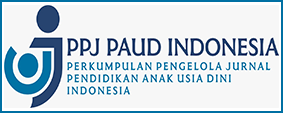
Author
Yanti Mustika(1
Prodi PG-PAUD, FIP, IKIP Siliwangi Bandung, Indonesia(1)
Prodi PG-PAUD, FIP, IKIP Siliwangi Bandung, Indonesia(2)
| Article Analytic |
Published : 2018-06-10
Article can trace at:
 Article Metrics
Article Metrics
Abstract Views: 3980 times
PDF Full Text Downloaded: 4116 times
Abstract
The purpose of this research is to know the influence of early childhood science experiments on child cognitive development in Kartika Siwi Pusdikpal Kindergarten Cimahi. Learning early childhood science experiments at Kartika Siwi Kindergarten can help early childhood knowledge and understanding of science concepts, and help put aspects related to science skills to improve children's cognition. The research problem is whether early childhood science experiments have an effect on the cognitive development of children in Kartika Siwi Kindergarten. The research method used is experimental research method. The population of this research is all children in Kartika Siwi Kindergarten which amounted to 26 children. Sampling research using total sampling technique. Data collection using pretest and postest, documentation, as well as observation and data processing using t-test statistical formula. Based on the results of hypothesis testing that t arithmetic > t table, is 8.20 > 2.05 so the hypothesis in this study accepted. The results showed that early childhood science experiments can affect children's cognitive development of 4.50 (good category). It is suggested to teachers to be able to improve cognitive abilities of children by using variations and innovative methods in different games so that the cognitive abilities of children can be further improved.
Keywords
References
Aisyah. (2017). Permainan Warna Berpengaruh terhadap Kreativitas Anak Usia Dini. Journal Obsesi (Journal of Early Chilhood Education, 1(2), 38 – 43. Retrieved from http://journal.stkiptam.ac.id/index.php/obsesi/article/view/324/289
Ali, M. (2012). Psikologi Remaja; Perkembangan Peserta Didik. Jakarta: Bumi Aksara.
Arikunto, S. (2009). Evaluasi Program Pendidikan Pedoman Teoritis Bagi Mahasiswa dan Praktisi Pendidikan. Jakarta: Bumi Aksara.
Arikunto, S. (2010). Prosedur Penelitian Suatu Pendekatan Praktik. Jakarta: Rineka Cipta.
Djamarah, S. (2010). Guru dan Anak Didik dalam Interaksi Edukatif. Jakarta: Rineka Cipta.
Hanafiah, Nanang dan Cucu S. (2010). Konsep Strategi Pembelajaran. Jakarta: Refika Aditama.
Istarani. (2011). 58 Model Pembelajaran Inovatif Referensi Guru dalam Menentukan Model Pembelajaran. Medan: Media Persada.
Putra, K., E. (2016). Efektivitas Media Pembelajaran Berbasis Gambar pada Materi Lingkungan PLSBT terhadap Prestasi Belajar Mahasiswa Prodi PG-PAUD STKIP Pahlawan Tuanku Tambusai. Journal Obsesi (Journal of Early Chilhood Education, 2(1), 11 – 17. Retrieved from http://journal.stkiptam.ac.id/index.php/obsesi/article/view/113/64
Sudjana, N. (2009). Penilaian Hasil Proses Belajar Mengajar. Bandung: Remaja Rosdakarya.
Sugiyono. (2008). Metode Penelitian Pendidikan. Bandung: Alfabeta.
Undang-Undang RI No. 20 Tahun 2003-2006 Tentang Sisdiknas. Bandung: Citra Umbara W.J.S.
Widia. (2007). Metode Pengajaran di Taman Kanak-Kanak. Jakarta: Ri/neka Cipta
Refbacks
- There are currently no refbacks.

_2022_inPress.png)








